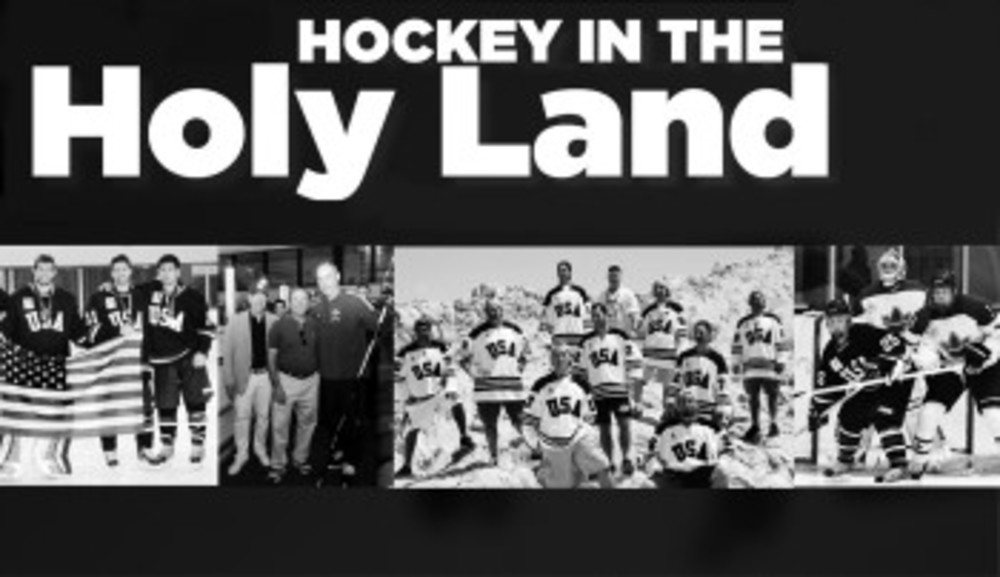Sabras and slap shots: North Americans bring hockey know-how to Israel
 In Israel, hockey is on the rise. Scenes from the Canada-U.S. showdown at the 2013 Maccabiah Games at the Canada Centre in T.
In Israel, hockey is on the rise. Scenes from the Canada-U.S. showdown at the 2013 Maccabiah Games at the Canada Centre in T.
BALTIMORE (JTA) – Drew Koike knew a bit about Israel: its capital, location, climate and biblical roots. But it never dawned on the 14-year-old Washingtonian that hockey existed in the country.
That was until earlier this year, when the coach of his hometown hockey program invited Koike and two other young charges on a summer trip to Israel to play and teach the sport.
The quartet spent 11 days there, mostly at the ice rink inside Canada Centre, a sports facility in the northern town of Metula.
Joining them were four Canadians, notably Laurie Boschman, a former National Hockey League veteran, and Tessa Bonhomme, who played for the Canadian women’s gold medal-winning team at the 2010 Olympics, as well as two teenage goalies.
For the eight North Americans, mostly non-Jews, venturing to the Middle East meant sharing their wisdom with more than 50 Israeli children devoted to the sport in a country with almost no hockey consciousness.
The visit grew out of the trip to Washington, D.C., four months earlier of 24 kids from the Canada Israel Hockey School, a program located at the Metula rink.
In equal measure, the visit to Metula reprised the hockey camps run there nearly two decades ago by the late Roger Neilson, a longtime NHL coach and observant Christian who loved Israel. Returning to Canada, Neilson would rave about each summer’s experience.
His programs are credited with having planted the seeds of hockey in Israel.
“Our plan from Day 1 was to start up the camp the way Roger Neilson used to do – bring kids here from North America from different backgrounds,” said Mitch Miller, an Ottawa resident who assembled and accompanied this summer’s group with plans to make it an annual event.
Miller and fellow Canadian Zach Springer were the only Jewish members of the North American delegation. And of the five teenagers, just Koike had been abroad before.
“I wasn’t sure what to expect, but I’ve had a great time,” Koike said . “The idea of hockey in Israel sounded like two cool things put together.”
Boschman, who scored 229 goals for five teams in a 14-year NHL career, had run hockey clinics for youths in four European countries while working for a Christian group, Hockey Ministries International – but never in Israel.
In Metula, he and Bonhomme, a defenseman who starred at Ohio State, led morning and afternoon on-ice drills along with midday training sessions.
Springer and his friend, Jack Moore, both 15 from Kingston, Ontario, imparted knowledge of the goalie position to their Israeli peers. By week’s end, Springer said, the two were particularly gratified by the progress shown by one of the Israelis.
Teaching in the program “was one of the main reasons I went,” Springer said.
All the while, the Washington coach, Tom Newberry, was instructing two dozen Israeli coaches seeking certification by U.S.A. Hockey, the Colorado-based organization that promotes youth hockey and oversees coaching; Newberry is its Southeast director.
The Ice Hockey Federation of Israel will honor the certifications, he said, with a goal of developing an indigenous certification program.
Newberry said the aim this summer was “to use this group of [Israeli] coaches and see what works.”
Newberry’s 12 hours of classroom instruction and some on-ice work centered on what he called “the science behind athlete-development.” That included training coaches to teach fundamentals like skating and stick-handling at age-appropriate levels, along with helping the adults fashion a coaching philosophy that includes a positive approach and recognizing when kids aren’t grasping a skill, then re-teaching it.
“It’s extremely positive to be in a room with a bunch of people who are eager to learn. They’re fully engaged, taking copious notes,” Newberry said of the sessions. “It’s exciting to know that … these gentlemen are really more than coaches; they’re students of the game.”
With only three ice hockey rinks in Israel – the others are in Maalot and Holon – most of the participating coaches came from in-line hockey programs.
“These are people who are quite passionate about hockey,” Boschman said. “That’s really fun to see in a non-traditional hockey market.”
Throughout the program, Newberry updated the parents of the three Washingtonians on the Hamas bombings of Israel, which were occurring far from Metula.
“We’re not letting it bother us,” he said of the attacks. “We’re completely safe, enjoying the country, the friendships and the incredible food.”
Before the hockey program started, the visitors spent several days touring. From Metula, they also took side trips to the Sea of Galilee, the old city of Acre, and the kibbutz and Druse village where several of the Israeli players live.
The mother of one Israeli player told them she’d moved the family to Metula to be closer to the rink.
Of the Israeli players, Koike said, “They’re fun to be with and fun to play hockey with. They’re really talented and work hard.”
When a U.S.-born soldier the group ran into asked about Bonhomme’s gold medal, she took it from her pocket, draped it around his neck and took his photograph.
Miller called the experience “a great first step” in deepening hockey’s presence in Israel. By next summer, he hopes to bring so many American and Canadian youth players that a second program needs to be organized.
Said Miller: “They’re not saying ‘Next year in Jerusalem’ but ‘Next year in Metula.’ ”







